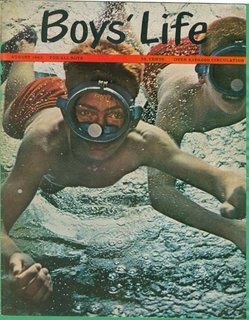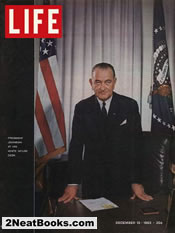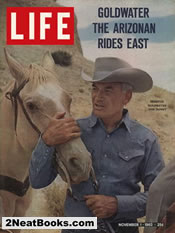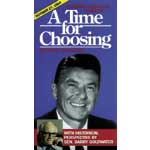A Boy's Life
How I Voted for Goldwater in 1964
[Re-posted from POI, 2006.]
Childhood is a delicate balance of expanding knowledge and carefully guarded ignorance. Never is more information pumped into young brains while other “facts of life” are blocked for future reference. This is as it should be. I’m all for growing slowly. In the case of my childhood, the “birds and bees” would be nothing more than feathered, fuzzy critters in the air until I was well past twelve. But as I entered third grade in 1964, an election year, I was exposed to the less pleasant facts of life about American politics.
Like most kids my age, I didn’t watch the news or pay attention to world events until Kennedy’s death. During the first four years of my life, Eisenhower was president, but I don’t recall knowing it. When his vice president, Richard Nixon, appeared in the first televised Presidential Debate in history against the younger, more handsome Kennedy, I wasn’t watching. When the first presidential election to include Alaska and Hawaii ended with Kennedy’s narrow victory (49.9% of the popular vote to Nixon’s 49.6%), I must have been in bed.
 Three years later, those shots in Dallas slapped a copy of Life Magazine on top of the Boy's Life my brothers and I shared. [They were in Cub Scouts at the time.]
Three years later, those shots in Dallas slapped a copy of Life Magazine on top of the Boy's Life my brothers and I shared. [They were in Cub Scouts at the time.]
As mentioned in a previous post, 1964 was a high-water mark in pop culture, but those rising stars on the cover of LIFE did not cast enough light to fully remove the shadow of national grief. Election day came just days before the one-year anniversary of Kennedy's assassination. Johnson had become President not by ballot but bloodshed; he had taken the oath of office while that blood was still on the widow's dress beside him. That same day, he wasted no time in moving into the Oval Office (insisting that all of Kennedy’s things be removed within a few hours of the shooting). It was a coldly efficient transition of power. This 1964 election, if Johnson were to win it, would make him not a constitutional protocol but the elected President of the United States.
That same day, he wasted no time in moving into the Oval Office (insisting that all of Kennedy’s things be removed within a few hours of the shooting). It was a coldly efficient transition of power. This 1964 election, if Johnson were to win it, would make him not a constitutional protocol but the elected President of the United States.
Johnson’s opponent was Arizona senator, Barry Goldwater. He had been introduced at that summer’s Republican Convention with a career-launching speech by Ronald Reagan (who two years later would become Governor of California and 16 years later…POTUS).
Reagan (who two years later would become Governor of California and 16 years later…POTUS).
This moment (also shown here) was the silver lining to Goldwater's presidential cloud.
At the time, I was entering third grade and blissfully unaware of everything I’ve shared thus far . All I knew about Goldwater was that my dad was voting for him. That was enough for me. I was all in.
Eventually, I learned to think on my own, but as a boy, knowing where my father stood on issues helped me know where to stand. It was not so much blind obedience—it was simply trusting what was familiar without the need to see for myself. Sort of like going to the bathroom in the middle of the night without turning on the light. Nine chances out of ten, a boy can hit his mark without fully interrupting his dreams. Growing up, my odds were at least that good whenever I stood with dad.
As a Goldwater supporter in a mostly Democrat Detroit suburb, I soon learned the meaning of the word minority. I would be reminded of it three times a day: once at mid-morning break; once after lunch; and once after last recess. I don’t mean to be crude by sharing the following account, but I think my readers will forgive me for “talking through” one of the formative experiences of my childhood.
In the boy’s restroom in the northeast corner of Huron Park Grammar School, there were three urinals—the old full-wall models that stood about as tall as the boys who used them. This shooting range was ideal for the proverbial contests little boys of that time were known to engage in. I, of course, resisted the urge to participate, but I must confess to witnessing amazing feats of marksmanship, limited only by the dimensions of the room.
of that time were known to engage in. I, of course, resisted the urge to participate, but I must confess to witnessing amazing feats of marksmanship, limited only by the dimensions of the room.
[My apologies to those unfamiliar with the gender-based plumbing alluded to in 1st Samuel 25:22 and five other times in 1st Samuel and 1st Kings.]
All such sport was put on hold in the weeks leading up to November’s election. The clever boys in the six classrooms who used that bathroom had more important matters to settle. They had devised a very pragmatic (albeit unscientific) polling method to see whose parents were voting for Johnson and whose were voting for Goldwater. The first fixture on the right was for Goldwater. (I’ll resist retelling the countless puns I endured because of that man’s name, but at least they put him on the right.) The other two were for Johnson. Needless to say, in my democrat neighborhood, most boys lined up at the two units on the left, and I (and one other kid) never had to wait in line to vote for Goldwater.
In addition to these childish politics, the grown-ups were also misbehaving. The Johnson campaign produced the following “Daisy Girl” political ad that implied Goldwater was eager to “push the button” that would trigger the mutually-assured self-destruction of the world. [The ad was pulled but stirred so much attention that it has never been forgotten.]
The Cold War was scary enough without ads like that. I actually watched election night coverage with my family that night. Goldwater did not win Michigan. While he was at it, he lost 44 other states. (In fact, he barely carried Arizona.) Nationally, he won only 52 electoral votes to Johnson’s 486. His loss came as no surprise to me. I’d seen his chances going down the drain for weeks. His campaign had a little surge toward the end, but every 3rd and 4th grade boy in my school knew from the start that Goldwater was a long shot.
[By the way... The plumbing picture above is not from the actual setting. I did go back to Huron Park Elementary School a few years ago. (It's no longer called a "grammar school."). It still has the same floor, beige tile walls in the hallways, same wooden doors, etc., but "security issues" that did not exist in the 60's are now a fact of life. I did not take a camera into the little boys' room and take the above picture. Can you imagine a fellow administrator trying to get permission to do that? Or worse yet...doing it without permission—snap a picture and step out with my camera to a nice school-police officer as the secretary says, "There he is, Officer, he said he wanted to take a picture of the urinals." No, I'm not that crazy. The fixtures above look just like the ones I was talking about, but they are actually from the Field Museum in Chicago—I got the photo from a web site that features famous plumbing from around the world. I'd pass along the address, but I don't want to dwell on this bathroom theme anymore than necessary.]
[Re-posted from POI, 2006.]
Childhood is a delicate balance of expanding knowledge and carefully guarded ignorance. Never is more information pumped into young brains while other “facts of life” are blocked for future reference. This is as it should be. I’m all for growing slowly. In the case of my childhood, the “birds and bees” would be nothing more than feathered, fuzzy critters in the air until I was well past twelve. But as I entered third grade in 1964, an election year, I was exposed to the less pleasant facts of life about American politics.
Like most kids my age, I didn’t watch the news or pay attention to world events until Kennedy’s death. During the first four years of my life, Eisenhower was president, but I don’t recall knowing it. When his vice president, Richard Nixon, appeared in the first televised Presidential Debate in history against the younger, more handsome Kennedy, I wasn’t watching. When the first presidential election to include Alaska and Hawaii ended with Kennedy’s narrow victory (49.9% of the popular vote to Nixon’s 49.6%), I must have been in bed.
 Three years later, those shots in Dallas slapped a copy of Life Magazine on top of the Boy's Life my brothers and I shared. [They were in Cub Scouts at the time.]
Three years later, those shots in Dallas slapped a copy of Life Magazine on top of the Boy's Life my brothers and I shared. [They were in Cub Scouts at the time.]
As mentioned in a previous post, 1964 was a high-water mark in pop culture, but those rising stars on the cover of LIFE did not cast enough light to fully remove the shadow of national grief. Election day came just days before the one-year anniversary of Kennedy's assassination. Johnson had become President not by ballot but bloodshed; he had taken the oath of office while that blood was still on the widow's dress beside him.
 That same day, he wasted no time in moving into the Oval Office (insisting that all of Kennedy’s things be removed within a few hours of the shooting). It was a coldly efficient transition of power. This 1964 election, if Johnson were to win it, would make him not a constitutional protocol but the elected President of the United States.
That same day, he wasted no time in moving into the Oval Office (insisting that all of Kennedy’s things be removed within a few hours of the shooting). It was a coldly efficient transition of power. This 1964 election, if Johnson were to win it, would make him not a constitutional protocol but the elected President of the United States.Johnson’s opponent was Arizona senator, Barry Goldwater. He had been introduced at that summer’s Republican Convention with a career-launching speech by Ronald
 Reagan (who two years later would become Governor of California and 16 years later…POTUS).
Reagan (who two years later would become Governor of California and 16 years later…POTUS).
This moment (also shown here) was the silver lining to Goldwater's presidential cloud.
At the time, I was entering third grade and blissfully unaware of everything I’ve shared thus far . All I knew about Goldwater was that my dad was voting for him. That was enough for me. I was all in.
Eventually, I learned to think on my own, but as a boy, knowing where my father stood on issues helped me know where to stand. It was not so much blind obedience—it was simply trusting what was familiar without the need to see for myself. Sort of like going to the bathroom in the middle of the night without turning on the light. Nine chances out of ten, a boy can hit his mark without fully interrupting his dreams. Growing up, my odds were at least that good whenever I stood with dad.
As a Goldwater supporter in a mostly Democrat Detroit suburb, I soon learned the meaning of the word minority. I would be reminded of it three times a day: once at mid-morning break; once after lunch; and once after last recess. I don’t mean to be crude by sharing the following account, but I think my readers will forgive me for “talking through” one of the formative experiences of my childhood.
In the boy’s restroom in the northeast corner of Huron Park Grammar School, there were three urinals—the old full-wall models that stood about as tall as the boys who used them. This shooting range was ideal for the proverbial contests little boys
 of that time were known to engage in. I, of course, resisted the urge to participate, but I must confess to witnessing amazing feats of marksmanship, limited only by the dimensions of the room.
of that time were known to engage in. I, of course, resisted the urge to participate, but I must confess to witnessing amazing feats of marksmanship, limited only by the dimensions of the room.[My apologies to those unfamiliar with the gender-based plumbing alluded to in 1st Samuel 25:22 and five other times in 1st Samuel and 1st Kings.]
All such sport was put on hold in the weeks leading up to November’s election. The clever boys in the six classrooms who used that bathroom had more important matters to settle. They had devised a very pragmatic (albeit unscientific) polling method to see whose parents were voting for Johnson and whose were voting for Goldwater. The first fixture on the right was for Goldwater. (I’ll resist retelling the countless puns I endured because of that man’s name, but at least they put him on the right.) The other two were for Johnson. Needless to say, in my democrat neighborhood, most boys lined up at the two units on the left, and I (and one other kid) never had to wait in line to vote for Goldwater.
In addition to these childish politics, the grown-ups were also misbehaving. The Johnson campaign produced the following “Daisy Girl” political ad that implied Goldwater was eager to “push the button” that would trigger the mutually-assured self-destruction of the world. [The ad was pulled but stirred so much attention that it has never been forgotten.]
The Cold War was scary enough without ads like that. I actually watched election night coverage with my family that night. Goldwater did not win Michigan. While he was at it, he lost 44 other states. (In fact, he barely carried Arizona.) Nationally, he won only 52 electoral votes to Johnson’s 486. His loss came as no surprise to me. I’d seen his chances going down the drain for weeks. His campaign had a little surge toward the end, but every 3rd and 4th grade boy in my school knew from the start that Goldwater was a long shot.
[By the way... The plumbing picture above is not from the actual setting. I did go back to Huron Park Elementary School a few years ago. (It's no longer called a "grammar school."). It still has the same floor, beige tile walls in the hallways, same wooden doors, etc., but "security issues" that did not exist in the 60's are now a fact of life. I did not take a camera into the little boys' room and take the above picture. Can you imagine a fellow administrator trying to get permission to do that? Or worse yet...doing it without permission—snap a picture and step out with my camera to a nice school-police officer as the secretary says, "There he is, Officer, he said he wanted to take a picture of the urinals." No, I'm not that crazy. The fixtures above look just like the ones I was talking about, but they are actually from the Field Museum in Chicago—I got the photo from a web site that features famous plumbing from around the world. I'd pass along the address, but I don't want to dwell on this bathroom theme anymore than necessary.]


0 Comments:
Post a Comment
<< Home